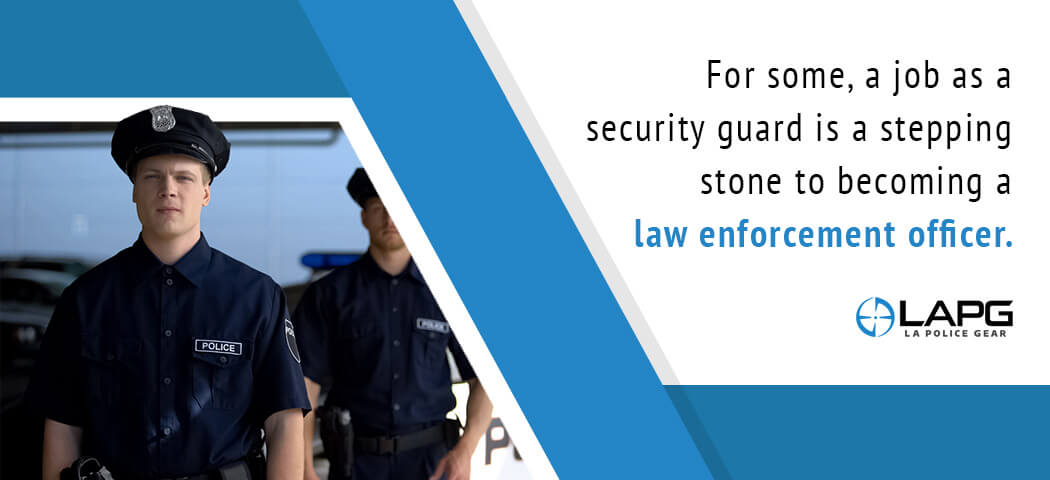how to become a security guard

Security guards are a front line of defense for many businesses, hospitals and universities. A security guard patrols the property they're hired to watch and act as a deterrent to criminal activity such as thefts, assaults or vandalism. While it's easier for people with prior military or law enforcement backgrounds to become security guards, you can still break into the field with no prior experience.
Keep reading to find out what a security guard does and what you need to do to become one.
What is a Security Guard
The primary job of a security guard is to deter crime and monitor the property of the business that hired them. For the most part, businesses in the private sector work with security agencies to hire security guards. Examples of private sector entities that hire security guards include museums, retail stores, banks, office buildings, hospitals and nightclubs. Larger corporations may hire their own security guards, and in this case, there is often a security director or similar position that supervises the security guards.
Having a human element as part of a business's security plan ensures that someone is always there to respond to alarms on the property and apprehend people who shouldn't be there. Security guards are generally instructed to contact law enforcement officers if they catch unauthorized people at the business or discover crimes in progress. If it's safe, they may hold a transgressor until law enforcement arrives.
Security guards sometimes provide bank escorts for the facilities they protect as well as safety escorts for people leaving buildings late at night. Other duties and tasks include:
- Ensuring that doors and windows are properly secured
- Monitoring alarm systems
- Interviewing possible witnesses and testifying in court if necessary
- Patrolling and monitoring properties to safeguard against criminal activities and fire
- Recording routine daily activities and unusual events
- Working closely with fire departments, emergency medical personnel and law enforcement

For some, a job as a security guard is a stepping stone to becoming a law enforcement officer. Many security guards with these aspirations often work full-time while attending college to get an associate's or bachelor's degree.
Becoming a Security Guard- Is It the Right Career Choice for Me?
Since being a security guard is not easy, it's often not the right career choice for everyone. The training can be extensive, and if you want to eventually become a police officer, there are several character traits that are helpful in both professions. A great security guard:
- Has good time management skills and is always on time
- Is a strong communicator
- Can de-escalate situations
- Can keep his or her temper in check
- Can get people to comply without touching them
- Has excellent situational awareness
- Stays cool under pressure
- Knows how to take and give orders
- Can control stressful situations
- Is flexible
- Can multitask
- Is respectful
- Knows how to use the tools of the trade
- Is honest to a fault
- Can write clear and concise reports
- Has integrity
- Is always professional
- Mirrors the image the client wants them to portray

General Requirements Necessary to Become a Security Guard
There are a few general requirements to become a security guard and these may vary by state or business preferences.
- You must be 18 years of age
- You must have a high school diploma or GED
- You must complete the necessary training
- You should have a relatively clean criminal history
- You need to be able to communicate well
- You should be able to listen to and follow directions as well as make quick decisions and exercise good judgment
- You should be able to work well with others and independently
- You should have strong problem-solving skills.
Being in good physical condition is a major plus since you'll be on your feet a lot. Employers may have additional physical requirements like being able to lift heavy amounts of weight, in case you need to drag someone to safety.
Maintaining a professional and courteous demeanor are also important aspects of being a security guard. Essentially, you represent the customer, so you must make a good impression. Police officers and security guards also need to have excellent customer service skills since you'll interact with the public often.
Appearance and attitude are equally important since you often stand as a criminal deterrent for the business. If a security guard looks sloppy, lazy and overweight, they don't present as much of a threat.
One of the most critical attributes to have as a security guard is the ability to work and make decisions in highly stressful situations. You may be involved in life-threatening incidents, so you can't freeze under pressure.

How to Apply for a Security Guard Position
Applying for a security guard position is quite simple.
- Find an open security guard position at a business or with a security agency
- Interview for the position
- Pass a criminal history and background check
- Successfully complete your training
On a side note, one nice thing about working for a security agency is they usually have regular customers who contact them when they have an open position. You don't have to do as much searching for jobs, and many companies will only hire through an agency.
Some states require you to apply for a license before anyone can hire you. For others, the licensing may come as part of the security guard training.
Security Guard Training and Education
Training varies from state to state and so do the tools you'll use. If you carry a firearm, you'll need to qualify to carry it. Firearms qualification requirements also differ by state. If you carry an expandable baton, you'll need specific training on that device as well.
Some employers will favor candidates with college degrees compared to those without one. Role-specific training is also critical because many states mandate training on the use of force, constitutional law, limitations of power and more.

There are also security guard specialties that may require additional training. These specialties include armored car security guards, loss prevention, bouncers and gaming surveillance officers.
In addition to the training you receive when you start, most states require you to recertify either every year or every other year. You'll have to recertify your gun as well, and this may occur multiple times a year.
Education isn't just limited to the basic training you receive when you first start. You can continue to educate yourself through an agency such as the International Foundation for Protection Officers, a state-approved school or college. You'll likely be responsible for the cost of any training above and beyond the basics.
As you gain experience, you can try to get certified through ASIS International, a global community of security experts from just about every industry.
Expected Salary for Security Guards
Salary varies significantly depending on your state and type of security job, i.e., armed vs. unarmed, working for an agency vs. a business that hires you directly, or your experience and education. The U.S. Bureau of Labor Statistics shows the median pay for gaming surveillance officers and security guards for 2019 is approximately $14.29 per hour or $29,710 per year.
The website has a note that as of May 2019, the median salary for gaming surveillance officers is $34,190. The difference may be that gaming surveillance officers often need experience with video surveillance and security.
You should be proud to put on a security guard uniform because not everyone can do the job. When you lace on your security guard shoes or boots, you never know where they may take you that day.
Shop Security Guard Uniforms
.CTAbtn {text-align:center;text-decoration:none;display:block;margin:0 auto;max-width:350px;background-color: #1c85ca; color: #fff; text-transform: uppercase; font-weight: 600; padding: 11px 30px;}.CTAbtn:hover {background-color: #000;}
Career Advancement
Working as a security guard gives you plenty of opportunities for career advancement, depending on your goals. If you want to become a law enforcement officer, experience as a security guard could help you.
With more experience, you could become a supervisor over other security guards or train new guards. Training others is often a rewarding opportunity. However, you need to have the right personality, attitude and industry knowledge.
After gaining some experience as a security guard, you may decide on another career path such as executive protection or an armored car guard. Universities and hospitals have complex security needs, so there may be lots of opportunities to advance once you've gained extensive experience.
Another job security guards sometimes transition into is a private investigator or PI. If you have a knack for following leads and figuring things out as well as excellent problem-solving skills, you may make a good PI.
Pros to Being a Security Guard
Here are some of the pros of being a security guard.
- No two days are the same, especially if you work at more than one site- You never know what each day may bring, and you'll likely have many funny stories to share. At least the ones that aren't confidential.
- Networking- You get the chance to make professional connections in many industries such as politicians, professors, nurses, doctors, celebrities, company executives and many others.
- A flexible schedule- You can choose a security job that fits your schedule. Maybe you're going to college during the day, so you want to work nights, or perhaps a daylight shift works better for your family.
Cons to Being a Security Guard
Like any job, there are also cons such as:
- You'll miss holidays and family events- Typically, security jobs require shift work. That may mean a combination of days, nights and weekends. Businesses need security 24 hours a day, every day so you'll work holidays, too. Working these hours means you'll miss time with your family.
- Violence- Violence is a common element of security work. You'll deal with crime, like assaults, larceny and vandalism. As a security guard, you must be prepared for the worst. You'll deal with psychiatric patients, threats and medical incidents involving serious bodily injury. Often, you're the first person on the scene for these events and you need to render aid and control the scene until more help arrives. The stress can take a physical and mental toll on your body.
- Long work hours- Working hours for security guards vary. You may work 12 or 8-hour shifts. Three-day weekends of 12-hour shifts can be exhausting. If something happens to the person relieving you, you can't leave the site unprotected. Unexpected incidents may also cause your shift to run over.
- No backup- Many security guards work alone and sometimes in remote areas. If you can call the local or state police for assistance, it may be a while until they get there, so you need to be able to hold your own.

Becoming a security guard is a process, but it can be a very rewarding career. Keep this information in mind when trying to decide if it's the right job for you.
A career in the security industry takes an investment, but it has many opportunities for career advancement and the ability to specialize. Now that you've learned how to become a security guard, the decision is up to you. So, what do you say? Are you going to dive in and start the process?
how to become a security guard
Source: https://lapolicegear.com/blog/how-to-become-a-security-guard/
Posted by: rodriguezmorbigh1992.blogspot.com

0 Response to "how to become a security guard"
Post a Comment